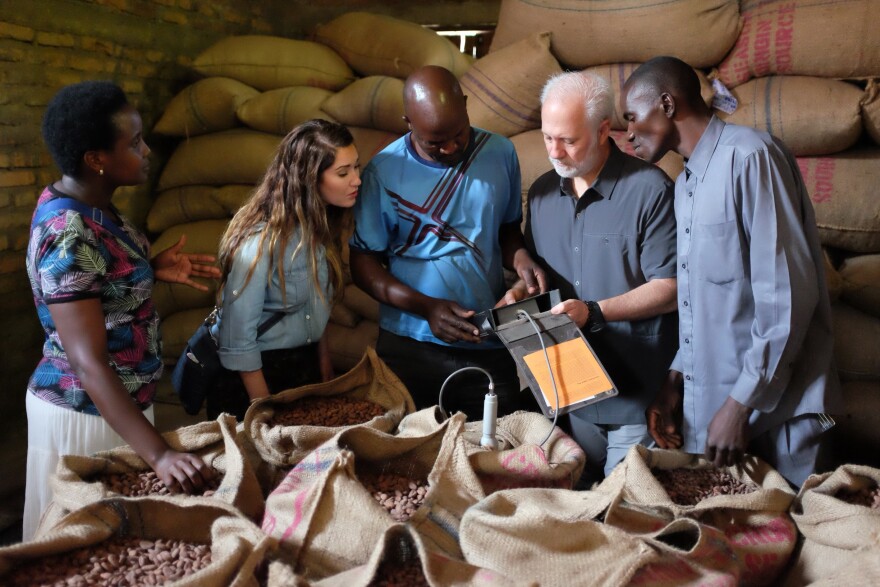Last week, the U.S. Supreme Court sided with giant food companies Nestlé and Cargill by throwing out a lawsuit that claimed they knowingly bought cocoa beans from farms in Africa that used child slave labor. Those companies had been sued by a group of six citizens of Mali who said they were forced to work as children on cocoa farms in Ivory Coast. Askinosie Chocolate, based in Springfield, Missouri, was an amicus party to the case and one of 18 small and mid-sized chocolate and cocoa companies that had hoped the U.S. Supreme Court would rule differently.
Founder and CEO Shawn Askinosie spoke with KSMU’s Jennifer Moore after the ruling. You can listen to the interview by clicking the “Play” icon below.
KSMU: You wanted the Supreme Court to uphold the decision of the Ninth Circuit, which back in 2018 found that the money that Nestle and Cargill paid to African farmers was essentially supporting child slave labor. What's your response to the high court's decision?

Askinosie: The decision is really in many ways shocking in this day and age, because when you strip away all of the fancy writing, there's an effect of this case. And the effect is that if you're a big chocolate company, Mars, Hershey, Nestlé, Mondelez, Barry Callebaut, and in this case Nestlé, you can have slaves in your supply chain. In fact, you can have child slaves in your supply chain as long as they're not in the United States. That was the effect of this case.
KSMU: On Cargill's website, it does have a page devoted to traceability and reliable sourcing. And it says, in the Ivory Coast, “half of the cocoa in our direct supply chain is now fully traceable from farm to factory.” But what about the other 50 percent?
Askinosie: The problem is that this this issue of child slave labor and forced labor as adults in West Africa

has been going on for more than 20 years. And all of these companies--in fact, the company that you just name, so Cargill and the company in this case, their co-defendant, Nestlé--they all signed on to something in 2003 put forth by Senators Harkin and Engel, United States Senate, where all of these companies around the world agreed that they would begin the process of eliminating child slave labor. And that was 18 years ago.
And so what's happened is Cargill, Nestle and these other companies have been moving the goalpost every three or four years since 2003. In fact, now, if you go to the Barry Callebaut website--they're the largest chocolate maker in the world based in Switzerland—they say now that they will have child slave labor eradicated by 2025. So, I mean, when there's no consequence—no consequence—to buying children, as in this case, these children were trafficked across the Mali border into Ivory Coast and sold for forty dollars apiece with zero consequence. Then, of course, you're going to move the goalpost. Why? Because your shareholders expect it.
KSMU: The U.S. Department of Labor came out with a report last fall on this very topic. Give us an update on what they found.
Askinosie: The U.S. Department of Labor found that there is today approximately 1.58 million children working, harvesting cocoa in Ghana in Ivory Coast. And your listeners should know that about 70 percent of the world's cocoa supply comes from those two countries. And the problem is that this issue of child slave labor, according to the Department of Labor, is not getting better. And to make matters worse, they estimate that of those, let's call it 1.6 million children, 48 percent of them are performing what they call “hazardous labor.”
This means that 10-year-old children are in these countries with machetes. 12-year-olds are applying chemicals without any protective equipment. And here we are in 2021. And they've had all these years to work on this problem.
And as you say, you can go to any one of these big companies' websites. Go to Mars or Hershey or Mondelez and Nestlé, and they all have these beautiful pictures of all of the wonderful things that they're doing at origin in these two countries. But yet, this problem remains and the Department of Labor affirmed that.
KSMU: In addition to the human rights violations, there's a business disadvantage here. Tell me about how ignoring human rights leads to a product that costs consumers less.
Askinosie: When you go fill your car up with gas and you're at the cash register, you're going to find a really big chocolate bar that's a whole lot less than mine. You know, my chocolate bar is three ounces and it's 85 grams. And it's going to cost, you know, maybe ten dollars. But the one at the cash register is going to cost a dollar fifty or two dollars. I wonder why. The reason is because they're able, now with license, to have child slave labor and forced labor and their supply chain. I mean, if a company is able to have zero costs for labor, then of course, the chocolate's going to be cheap.
You want to talk about an anti-competitive advantage for Nestle and Mars and Hershey's and companies like them? That's it. And it should be outlawed. And this problem needs to be eradicated and it needs to happen in the courts of the United States, unfortunately. Because it’s not going to happen in Europe.
(Note: Askinosie will participate in a Zoom webinar Thursday on the court ruling. The Zoom link to watch is here: https://us02web.zoom.us/webinar/register/WN_F2RUBBJfTZWsxD3m5h-kug )



